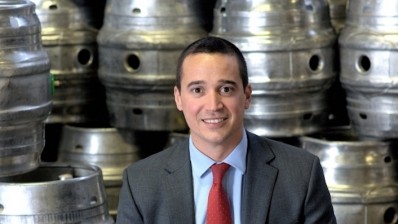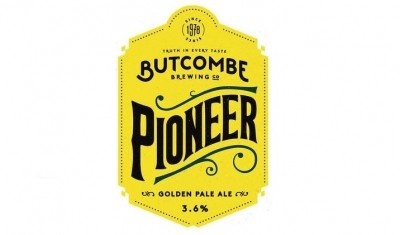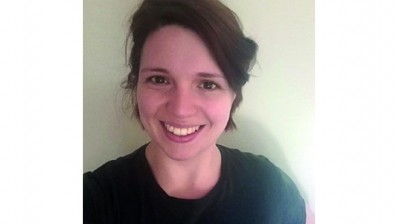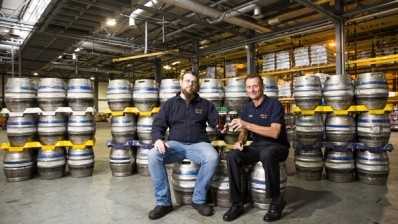"We want to be a proper regional brewer with a tied estate" - Mark Crowther on his Butcombe plans
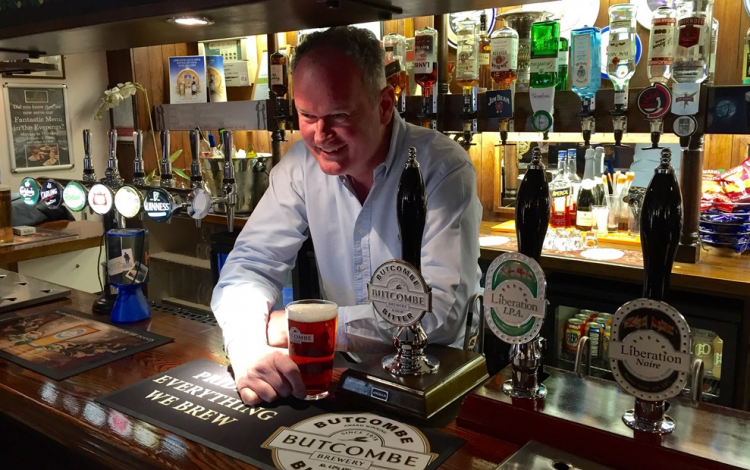
Across the table in the Butcombe Brewery boardroom a glint hardens in Mark Crowther's eyes, and in his head he's no doubt rubbing together a metaphorical pair of plams.
"Eighty million pounds," he says. "We can do a lot of damage with that."
The windfall did not come easy by the sound of it. The £118m deal that transferred Butcombe's parent company, Jersey-based Liberation Group, from LGV Capital to Caledonia Investments only completed in September, and "the refinancing seems like all I've been working on," Crowther sighs.
But now he can start spending the money. Caledonia has ring-fenced £40m to invest in the business with a matching £40m coming from the bank. And most of it will go on expanding and developing the Butcombe pub estate.
Four sites have already been added, bringing the total to 19, and another four are promised to be open by Christmas. Crowther belives there is potential for 100, though "we're not chasing numbers. We might buy 50 sites or we might buy 80 sites, but they'll all be really good-quality freehold pubs that will help double the value of the business in four to five years".
The strategic aim, crucial to luring Caledonia on board, is to make Butcombe "the regional brewer for the West Country", a geography that Crowther defines as "the old Courage Brewery territory... between Exeter and the Cotswolds".
And like a classic regional brewer, it will be a mixed estate. Since Liberation took over the business from Guy Newell at the end of 2014, 10 of its managed pubs have been transferred to tenancy on 10-year, fully tied agreements.
Crowther says they mimic the kind of tenancies you'll find at a family brewery - though he's quite keen on using the strength of the Butcombe brand to secure reciprocal deals with other brewers that continually refresh the offer on the pumps.
Of the latest acquisitions, two, the Pelican, at Chew Magna, Somerset, and the Old Restoration Inn, in Cheltenham, Gloucestershire, are managed, and two, the Charlton Inn, Shepton Mallet, and the Carpenters Arms, Chilthorne Domer, both in Somerset, are tenanted.
"We're not just a property company, we want to be a proper regional brewer with a tied estate," explains Crowther, "We are looking at every pub on a micro level to decide its best home, whether it should be managed or tenanted, and that's working well for us.
"We're living in uncertain times in terms of trading - and Brexit isn't helping. We have higher costs, like the living wage, and inflation may be coming back. You can't pass all that on to the consumer so we need to be more efficient, and having a brewery and a mixed estate gives us more levers to pull."
One of those levers is accommodation, "a big thing for the managed estate", and planning applications have already been lodged to add letting rooms at three pubs.
Although it's in rather different trading circumstances, the Somerset-based business might well turn out to resemble Liberation's existing Channel Islands operation. There was, indeed, something about Butcombe that reminded Crowther of Liberation at the time he led the buy-out of the Jersey Brewery business with LGV in 2008.
"We looked at three or four companies on the mainland, but Butcombe fitted the bill. It was like Liberation in that it had 15 freehold pubs at the time, good sustainable pubs within a tight geography.
"There was the potential to grow, and it would give us a platform in the UK that would attract bidders when it came to refinancing.
"We wanted to keep brewing here and look at what more we could do with it. We've been investing in people and in capex on things like our distribution fleet and beer casks."
The people included brewing director Stuart Howe, the man who put Sharp's Brewery on the map. He stayed for eight months, working to improve Butcombe's brewing consistency.
It all got the company into the kind of shape that would attract bidders and enable LGV to exit the business with an impressive return of almost three times investment. Now the business is set to accelerate its development.
Among new appointments are operations director Mark Harding, drafted in from Bath Ales to manage various projects, Jayson Perfect from Palmers as MD of Butcombe's pub division, and head brewer Colin Paige, who worked at Hop Back Brewery and Fuller's before going to the antipodes with beer and wine producer Lion Nathan. Among other things he'll be raising Butcombe's profile in the burgeoning craft-beer sector.
A new IT platform will hopefully go live early in 2017 - Butcombe is working with BT to upgrade its broadband - and a rebranding is planned for next February.
Crowther describes that as a "refresh", nothing too radical, but as well as rebadging the beers, it will be an opportunity to introduce consistent signage across the expanding pub estate.
Rest assured, he says, that while Butcombe will continue to benefit from the back-office systems and supply deals that come from being part of Liberation, it will retain a distinct identity as far as customers are concerned.
At the brewery, production is pressing close to the maximum some months, so the plan is to move distribution and warehousing off-site to make space for more fermenting vessels and double capacity.
It will make sure the company can keep up with demand from all those extra pubs, a free trade that appreciates Butcombe as one of the country's most famous cask-ale brands and a growing bottled business among supermarkets.
Crowther is excited about the prospects, and confident a regional brewer in the West Country is well placed to ride economic and political uncertainty.
"The local economy we're trading in, with its middle-class, middle-aged drinkers and diners, is less susceptible to slowdowns; the Bristol area is second only to London in terms of of per capita disposable income; and the prospect of the electrification of the train line down to here will give the West Country another kick. It's an exciting area to be in.
"If inflation returns, people might stop spending money on cars, but they'll still want affordable luxuries, and that's exactly what our pubs will be offering."
